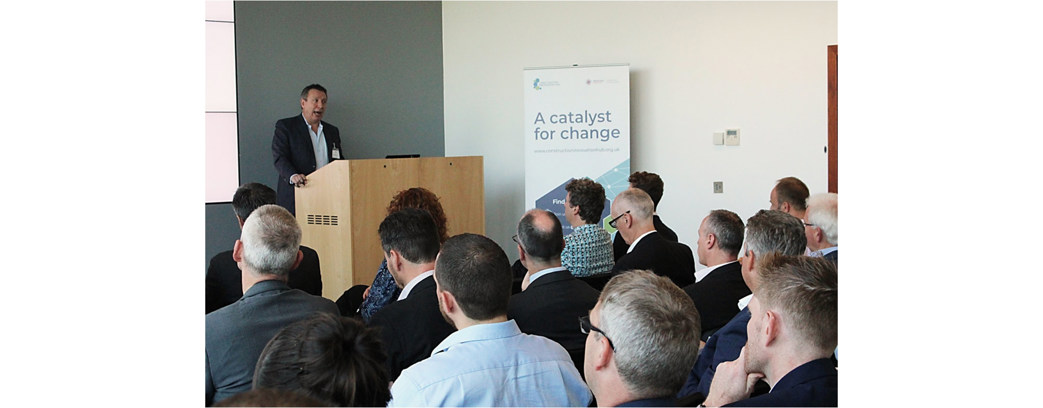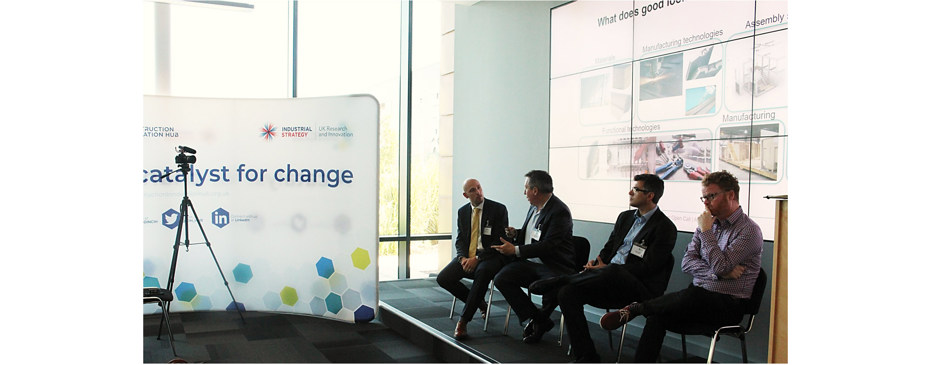Bridge Programme
Platform ProgrammeThe arguments about the need to transform construction are well rehearsed. Likewise, there is no shortage of reports, articles and recommendations telling the construction industry what it should do to “fix” itself; I should know – I wrote some of them myself. And yet, we still have a sector that underperforms the wider economy and is not widely viewed as being safe, sustainable, innovative or attractive to join. So, a transformation is still very much required. But unlike in the past, there is a growing consensus and momentum behind a change programme, and – crucially – funding to help deliver it.
The Construction Innovation Hub, which I have the privilege of leading, will play a key role in driving this transformation. We have a clear mandate. Our mission is to be a catalyst for transforming the UK construction sector through manufacturing technologies and digital ways of working – boosting productivity, exports and asset performance to benefit society.
Our technical programme – being delivered by teams from the Manufactory Technology Centre (MTC), BRE and the Centre for Digital Built Britain (CDBB) working with our partners and stakeholders – will be the main vehicle through which we will deliver our scope. As just one example, on 29 August, we launched the open call for our Platform Design Programme.

Picture: The Platform Design Programme announced to industry through an Open Call at the Manufacturing Technology Centre
This Programme builds on the principles set out by the Infrastructure and Projects Authority in 2018 through their call for evidence on adopting a platform approach to design for manufacture and assembly. Their call for evidence report said ‘ … we will use a set of digitally designed components across multiple types of built asset and apply those components wherever possible, thereby minimising the need to design bespoke components for different types of asset. For example, a single component could be used as part of a school, hospital, prison building or station.’.
Our Platform Design Programme will develop and embed these principles, helping to create new platform solutions that can be deployed across multiple projects and sectors. By working with industry through this programme we aim to identify, refine and develop solutions that can be deployed at scale. By the end of August, around 90 organisations had already registered interest in this programme, with around 60% of these being small to medium-sized enterprises (SMEs).

Picture: Q&A session during the Platform Design Open Call briefing event on 29 July
This is a crucial element of our programme and an excellent example of what a UK Research and Innovation (UKRI)-funded programme can help deliver. So in this case, rather than conducting a purely academic or theoretical exercise, we will actually build a proof of concept building at the Manufacturing Technology Centre in Coventry, and install the solutions that have been selected and developed through this programme, therefore showcasing the platform principles of a set of components that have the potential to be used across multiple sectors.
There is still time to engage with this programme and the opportunities are significant. This programme will not only establish the rules and standards for how components should connect to a superstructure, but also set out criteria for how the physical properties, quality, safety, environmental performance and other features will be valued and used to inform decision making in the future. We will also work with government and industry to establish clear rules that both protect Intellectual Property and enable a competitive and sustainable market to be established. Let’s not forget, the government spends around £15 billion each year on buildings – new schools, hospitals, offices, social houses et cetera. Helping them to embed more productive, sustainable and better performing solutions will benefit our industry and improve the impact we have on society at large.
So the £72 million funding we have received from UKRI as part of the Construction Sector Deal enables us to develop, support and trial outputs that support the ambitions of the Industrial Strategy. But our outputs alone will not be enough, there is a need for joined up action. What is the point of having a suite of new products, solutions and methodologies that support a more productive future if no one is willing or able to procure them? And for these to succeed, we need to ensure there are the right incentives for industry to invest in developing the capability, capacity and skills required to deliver them.
Which brings me to value. What would make government or any construction client choose to buy differently based on whole life performance? And why would businesses invest in innovative solutions and develop new skills if they were uncertain that this investment would yield returns?
We need to change how we think and talk about value. Value should not be measured purely by how cheap a product or service can be bought. Selecting the lowest initial capital cost with the most onerous risk transfer rarely – if ever – has yielded the best outcomes.
Value should be measured by a broader and longer-term set of measures – with a clearer and more consistent approach to how decisions are made which improve value. It should consider both direct and indirect benefits as well as whole life cost. This means thinking beyond the project and into its operational life. Crucially it also means valuing the benefits and impacts on wider society – not just from the perspective of the user, owner or operator. Therefore, it also means considering how much carbon is produced in production, how much energy is used in both construction and operation, how much waste we are sending to landfill, the emissions from transporting plant and materials to our site, how many jobs are created, how local communities are supported and empowered. There are many more.
So at the Construction Innovation Hub, we see our role as going beyond simply delivering our technical programme. We are already working with the architects of the Sector Deal – the Construction Leadership Council and other UKRI funded programmes being delivered through the Industrial Strategy Challenge Fund, in particular Network+ and the Active Building Centre.
Together, we will be working with government and wider construction sector clients to help them develop the capability, capacity and appetite for this exciting transformation journey. We cannot do this alone.
But I can assure you of this; we will measure our success not by what we have done, but by the impact we have on transforming the construction industry in the UK so that – finally- we still have a sector that matches the performance of the best sectors of the wider economy and is widely viewed as being safe, sustainable, innovative and attractive to join.
Keith Waller is the Construction Innovation Hub’s Programme Director.